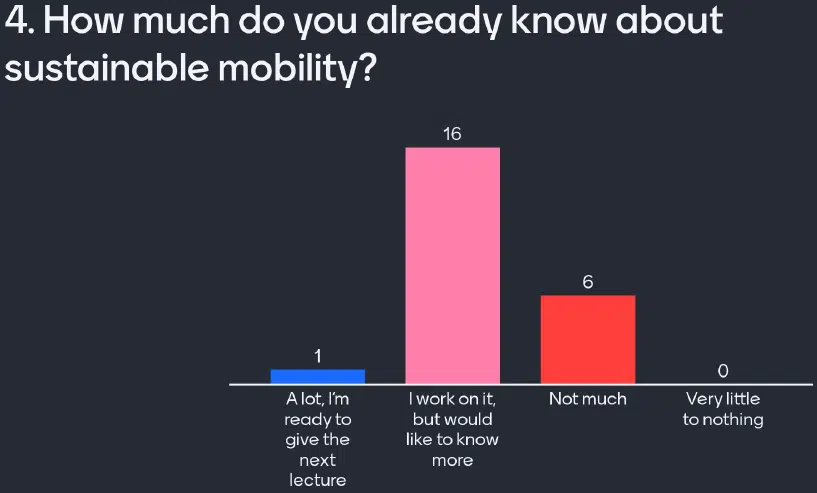Linus Platzer & Robert Zimmermann
Executive Programme in Sustainable Transport – Capacity Building Training Workshop for Indian officials.
To successfully implement the mobility transition, ambition needs to be accompanied by expertise and capacity for project implementation. Within this context, TUMI has been supporting the Indian Ministry of Housing and Urban Affairs (MoHUA) in organizing an Executive Programme in Sustainable Transport for capacity building of technical functionaries involved in the implementation of transport projects. MoHUA, launched the Executive Programme in Sustainable Transport with support from the GIZ supported project INTEGRATED SUSTAINABLE URBAN TRANSPORT SYSTEMS FOR SMART CITIES (SMART-SUT) during the Urban Mobility India Conference 2020.
Supported by GIZ, CEPT Research and Development Foundation (CRDF), the Institute of Urban Transport (IUT) and the global Transformative Urban Mobility Initiative (TUMI), the training took place from February 22nd to March 5th 2021, with 28 decision-makers from 17 Indian states and 2 Union Territories. Adopting an experiential approach, the program focused on how to sensitize participants to new emerging areas and subsectors in transport, their inter-relationships and role in achieving sustainability.
The Executive Program in Sustainable Transport was inaugurated jointly by Mr. Jaideep – Officer in Special Duty (Urban Transport) & Ex. Offico Joint Secretary, MoHUA and Dr. Julie Reviere – GIZ (India) Country Director. The executive program was introduced by Mr. Juergen Baumann, Project Director – SMART-SUT and Prof. Shivanand Swamy – CEPT. The workshop focused on some very important areas – gender mainstreaming, planning for walking and cycling, public transport planning, multi-modal integration, demand management and ITS, institutions, and financing mechanisms.
In cooperation with SMART-SUT and CEPT, TUMI supported the design and implementation of the training with global experience on learning methods and the preparation of specific workshop sessions. The workshop was held for 6 days, having a different thematic focus each day.
The program was designed to be highly interactive and engaging despite being all virtual, three examples
The first day was intended to inaugurate the program and familiarize participants with several aspects of sustainable mobility in urban context. In the warmup session, participants were asked to answer survey questions about their personal connection to sustainable mobility to reflect about the prior knowledge regarding sustainable mobility. With the average commute length in Indian cities of about 8km, everyone had a story to tell.

Example from warm up questionnaire
On the 2nd day, in the second session – among others – the Streetmix tool was introduced to the participants. The tool was used for a group exercise – for redesigning streets to accommodate the needs of the people and the environment. Showing the advantages and potentials of a participatory urban planning process to develop street cross sections which are more pedestrian and cyclist friendly.
The groups led extensive discussions on how to reshape street space and allocate more room to pedestrians, cyclists, safety, and green space. Here are some results of the group activity:

Street cross section before

Group work result

Group work result
On the third day, the thematic focus was on public transit and gender mainstreaming. TUMI supported the session by sharing knowledge and experiences on the challenges and good practices. Participants also received information on TUMI’s work through the Women Mobilize Women initiative, and resources around the topic such as the 5 Principles for Women and Transport Poster. After a thematic input, which recapped some information of a short impulse on Day 1, participants worked on case studies in small groups. The session was accompanied by great inputs and vivid discussions regarding topics such as last-mile connectivity, safety, female representation in transport undertaking and more.

Kerala last-mile connectivity
To read more about the program and session content please visit GIZ India Transport (@giztransportIN) / Twitter
Follow-Up
The final component of the training program – Cross Learning will consist of a study tour to German cities – Munich and Berlin. This will expose participants to international transport planning policy and practice. Besides site visits, lectures, and discussions on various aspects of urban mobility, the participants will also experience the transport systems enabling them to draw comparisons and contextualise their learnings to Indian cities. The participants will experience various transport systems from a user perspective – both from the Indian and international context. The exposure visit will be a great opportunity to draw comparisons and contextualize their learnings to Indian cities. Of course, this is pending a favorable health and travel situation with regards to the COVID-19 pandemic.
This will allow the topics introduced in the training week and subsequent learning events to be explored through practical on-site learning and interaction with German decision-makers and experts. TUMI will support and accompany the study tour and provide knowledge, contacts and practical support to the delegation. Counting on a good network of contacts in the field of sustainable mobility through our initiatives, project staff and partners, TUMI is looking forward to hosting the Indian colleagues.
